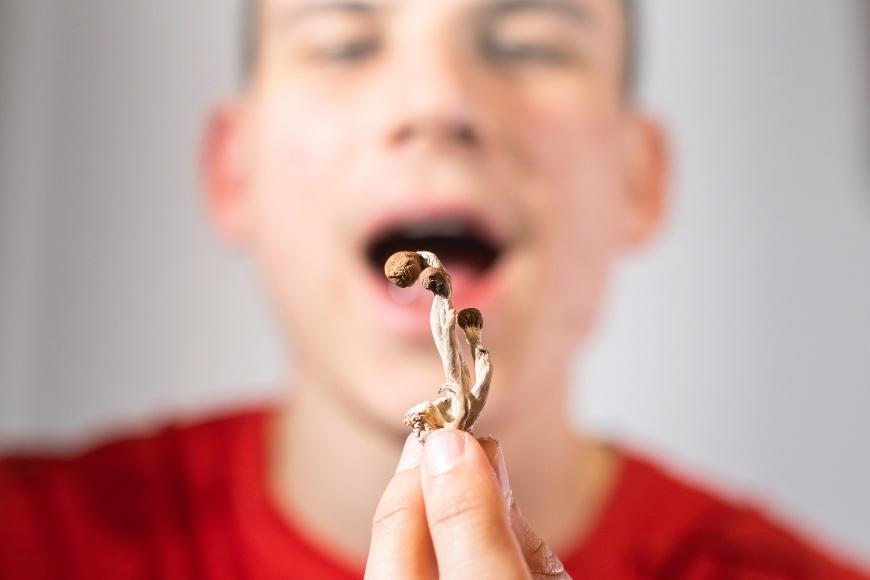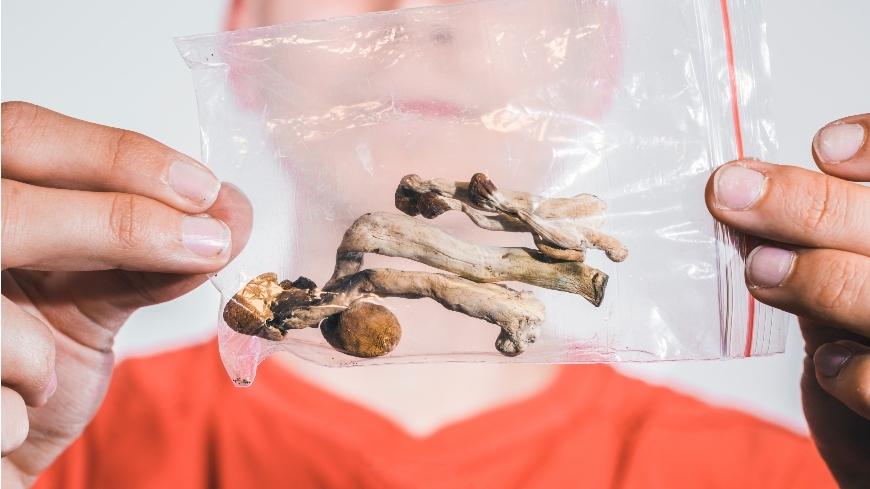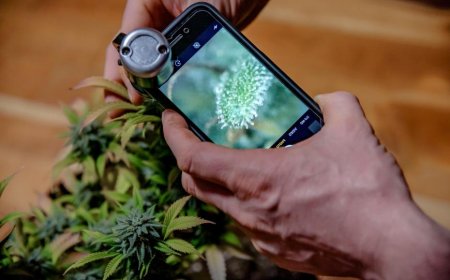What You Need to Know About Psilocybin Tolerance
Discover what you need to know about psilocybin tolerance, factors influencing it, resetting strategies, microdosing benefits, and responsible psychedelic use.

What You Need to Know About Psilocybin Tolerance is essential for responsible and enjoyable use of magic mushrooms. In this blog post, we'll dive deep into the factors influencing psilocybin tolerance and how it can impact your psychedelic experiences.
As you continue reading, you'll discover strategies for resetting your psilocybin tolerance levels to ensure more profound and meaningful trips. We will also explore the role of microdosing in managing tolerance while reaping potential benefits from these powerful substances.
Furthermore, What You Need to Know About Psilocybin Tolerance includes understanding cross-tolerance between psychedelics and its implications on usage patterns. Finally, we'll discuss the importance of responsible use when experimenting with any psychedelic substance – ensuring safety, well-being, and maximizing personal growth opportunities throughout your journey.
Table of Contents:
- Psilocybin Tolerance: What You Need to Know
- Factors Affecting Psilocybin Tolerance
- Strategies for Resetting Psilocybin Tolerance
- The Benefits of Microdosing for Resetting Psilocybin Tolerance
- Cross-Tolerance Between Psychedelics
- Responsible Use of Psychedelics
- Conclusion
Psilocybin Tolerance: What You Need to Know
It's essential to comprehend how magic mushroom tolerance for psilocybin builds and can be reset as you explore the world of psychedelics. Psilocybin is the active compound found in magic mushrooms that makes you see unicorns and rainbows when consumed. However, frequent use of this substance can lead to increased tolerance levels, diminishing its effects over time.
Tolerance happens when your body becomes less responsive to a drug due to repeated exposure. In the case of psilocybin, this means that you may need higher doses to achieve similar effects as before or might not feel any effect at all from previously effective doses. This phenomenon is called "tachyphylaxis," and understanding it will help ensure meaningful psychedelic experiences while minimizing potential risks associated with excessive consumption.
Research on psilocybin tolerance has shown that its development varies among individuals but generally occurs rapidly within days of consecutive use. The good news is that this tolerance tends to dissipate quickly after stopping usage - usually within one week or even just a few days for some people.
To maintain an optimal level of sensitivity towards psilocybin and avoid developing significant tolerance issues, it's crucial not only to know about factors influencing your personal response but also to implement strategies like taking breaks between trips (also known as "tolerance breaks") or experimenting with microdosing regimens.
In addition, being aware of cross-tolerance between different psychedelics such as LSD and DMT can help prevent inadvertently increasing your overall tolerance levels. For instance, if you've recently consumed LSD and then take psilocybin shortly after, the effects of the latter might be diminished due to cross-tolerance.
Ultimately, responsible use of psychedelics involves understanding your own tolerance levels and adjusting your consumption habits accordingly. This will not only help ensure more profound and meaningful experiences but also reduce potential risks associated with excessive dosing or frequent usage. Stay informed about psychedelic substances, respect their power, and always prioritize safety in your journey towards personal growth and self-discovery.

Factors Affecting Psilocybin Tolerance
Psilocybin tolerance can be influenced by various factors, and understanding them is crucial for responsible use and achieving meaningful psychedelic experiences. These factors include frequency of use, dosage, individual metabolism, and cross-tolerance with other substances.
Frequency of Use
The more often you consume psilocybin-containing products, the faster your body will develop a tolerance to its effects. To avoid building up a significant tolerance, it's essential to space out your trips adequately.
Dosage
The amount of psilocybin you consume can also affect the development of tolerance. Higher doses can lead to quicker onset of tolerance compared to lower amounts. To help prevent tolerance, it's essential to calculate an ideal dose based on variables like body mass and experience level.
Individual Metabolism
Your body's unique metabolic rate influences how quickly you process psilocybin and develop a tolerance. Factors like age, genetics, diet, and exercise habits all play a part in determining how rapidly your system metabolizes psychedelics like psilocybin.
Cross-Tolerance with Other Substances
Taking other psychedelics such as LSD or mescaline can impact your sensitivity towards psilocybin due to their similar mechanisms within the brain. This phenomenon is known as cross-tolerance. To avoid this, it's essential to space out your use of different psychedelics and be aware of the potential for reduced effects when switching between substances.
By being mindful of these factors, you can better manage your psychedelic journeys while minimizing the risk of developing a significant tolerance. Remember to always approach psilocybin use with respect and caution, and seek professional guidance if needed.
Strategies for Resetting Psilocybin Tolerance
Taking regular breaks from psilocybin can help to reset tolerance and keep your psychedelic experiences fresh. Here are some strategies:
Take a Tolerance Break
The most effective way to reset your psilocybin tolerance is by taking a break from it. Research suggests waiting at least two weeks between trips should be sufficient for most people. Give your body time to clear the substance from its system and return neurotransmitter levels back to their baseline state.
Maintain a Healthy Lifestyle
Eating well-balanced meals, staying hydrated, getting regular exercise, and ensuring adequate sleep all contribute positively towards maintaining optimal brain function and overall health. These habits will not only help with resetting tolerance but also enhance the quality of future psychedelic experiences.
Reduce Stress Levels
Stress can impact the effectiveness of psychedelics like psilocybin, so managing stress levels during periods when you're not using these substances could potentially improve their efficacy once reintroduced into your routine.
- Practicing mindfulness meditation can be beneficial for reducing stress and tension, which could potentially reset your psilocybin tolerance when reintroduced.
- Incorporating yoga into your daily routine can also assist in stress reduction and improve overall well-being.
Try Different Psychedelic Substances
If you're interested in exploring other psychedelic substances during a break from psilocybin, be aware of the potential for cross-tolerance. LSD and psilocybin have been found to exhibit cross-tolerance effects. To avoid this issue, consider trying non-psychedelic alternatives like meditation or breathwork techniques that can induce altered states of consciousness without impacting your tolerance levels.
In summary, taking regular breaks from psilocybin use while maintaining a healthy lifestyle is key to resetting your tolerance. Being mindful of cross-tolerance with other psychedelics will ensure that you continue to enjoy meaningful experiences on your journey with these powerful substances.
The Benefits of Microdosing for Resetting Psilocybin Tolerance
Microdosing has become a popular way to explore the potential benefits of psychedelics without tripping too hard. By taking small doses of substances like psilocybin, users can maintain their daily routines while still experiencing cognitive and emotional benefits.
Microdosing may offer an advantage over traditional "tolerance breaks" due to its potential for reducing the rate of tolerance development, allowing users to experiment with psilocybin more frequently.
Research on microdosing is still limited but growing steadily. A study published in the Journal of Psychopharmacology found that participants who engaged in microdosing reported improvements in mental health and well-being compared to those who did not engage in this practice.
How to Incorporate Microdosing into Your Routine
- Stick to a consistent dosing schedule: By maintaining a regular microdose regimen (e.g., once every three days), you can potentially avoid building up substantial tolerance levels while still enjoying the positive effects associated with psilocybin use.
- Combine with other self-care practices: Incorporating healthy habits such as meditation, exercise, and proper nutrition can further support overall well-being and contribute positively towards resetting your tolerance levels.
- Approach with intention and mindfulness: Being clear about your purpose for microdosing and staying aware of the effects on your body can help you better understand how to adjust dosages or schedules as needed.
It may take some experimentation to discover the most effective routine for resetting one's psilocybin tolerance, so it is important to be mindful of your experience and adjust dosages or schedules as needed. Additionally, while microdosing might help reduce tolerance buildup over time, it is not guaranteed to completely eliminate it. Therefore, taking occasional breaks from all forms of psychedelic use remains an important consideration in managing tolerance levels effectively.
In conclusion, incorporating microdosing into your psychedelic journey could serve as a valuable tool for managing psilocybin tolerance while still enjoying its potential benefits. As always, practicing responsible use and staying informed about current research are crucial steps towards achieving meaningful experiences with psychedelics like psilocybin.

Cross-Tolerance Between Psychedelics
Exploring psychedelics can be an awe-inspiring experience, but it's essential to comprehend the way one drug might influence your resistance for another. This phenomenon is known as cross-tolerance, and it occurs when two or more substances affect similar receptors in the brain.
How Cross-Tolerance Works
A phenomenon known as cross-tolerance occurs when two or more substances interact with similar receptors in the brain, such as psilocybin, LSD and mescaline which all affect the serotonin 5-HT2A receptor. If you've recently consumed LSD, it's likely that the regular dosage of psilocybin mushrooms won't have as much impact due to your increased resistance from prior exposure.
However, not all psychedelic substances share cross-tolerance. DMT appears to lack considerable cross-tolerance with other classic psychedelics, such as psilocybin or LSD, despite engaging similar receptors (source).
Strategies to Minimize Cross-Tolerance
- Space out your trips: Give yourself enough time between psychedelic sessions for your tolerance levels to reset naturally - usually around 1-3 weeks depending on individual factors.
- Vary your choice of substance: Rotate between different types of psychedelics to minimize the risk of developing a strong cross-tolerance.
- Respect dosage guidelines: Follow recommended dosages for each substance and avoid increasing your dose in an attempt to overcome tolerance - this can lead to negative experiences or potential harm.
Understanding how cross-tolerance between psychedelics works is crucial for ensuring safe and meaningful experiences. By being mindful of the substances you use, spacing out your trips, and respecting dosage guidelines, you can better navigate the world of psychedelics while minimizing any potential risks associated with increased tolerance levels.
Responsible Use of Psychedelics
Understanding your own tolerance levels is crucial for achieving safe and meaningful psychedelic experiences. For safe and meaningful experiences, practice responsible use of psilocybin mushrooms and other psychedelics.
If you're new to psychedelics or haven't used them in a while, start with a low dose to gauge your sensitivity. Set an intention for each trip to guide your experience towards personal growth or self-discovery.
Maintaining a healthy lifestyle is also important for managing tolerance levels. Optimal health is paramount for a successful psychedelic experience, thus regular exercise, proper nutrition, adequate sleep and stress management are all key components to consider.
Guidelines for Responsible Use
- Pace yourself: Don't rush into taking large doses or tripping too frequently; give yourself time between trips for reflection and integration of insights gained during the experience.
- Trip safely: Ensure that you have a comfortable environment with trusted friends who can provide support if needed (trip sitters). Avoid mixing substances as this may lead to unpredictable effects on tolerance levels.
- Educate yourself: Stay informed about the risks associated with psychedelic use by reading up on current research findings from reputable sources.
- Respect the substance: Recognize that psychedelics are powerful tools with potential risks and benefits; treat them with respect by being mindful of dosage, frequency, and set and setting.
Before consuming psychedelics, be aware of any personal or familial history with mental health issues. Some may be more prone to psychological difficulties from using psychedelics, depending on their existing conditions or genetic makeup. If you have concerns about your mental health in relation to psychedelic use, consult a healthcare professional for guidance.
By taking a responsible approach towards psilocybin mushrooms and other psychedelics, you can ensure that your experiences remain positive and beneficial. Remember to understand your tolerance levels, practice harm reduction strategies, and stay informed about current research findings on psychedelics' safety profile.
Conclusion
Understanding psilocybin tolerance is crucial for safe and effective use of this substance. Factors such as frequency of use and dosage can greatly influence tolerance levels. Strategies such as taking breaks and changing up dosage can help reset tolerance. Microdosing may also play a role in resetting tolerance, but cross-tolerance between psychedelics should be considered. Responsible use of psychedelics is important for personal safety and the overall perception of these substances.






































































































































